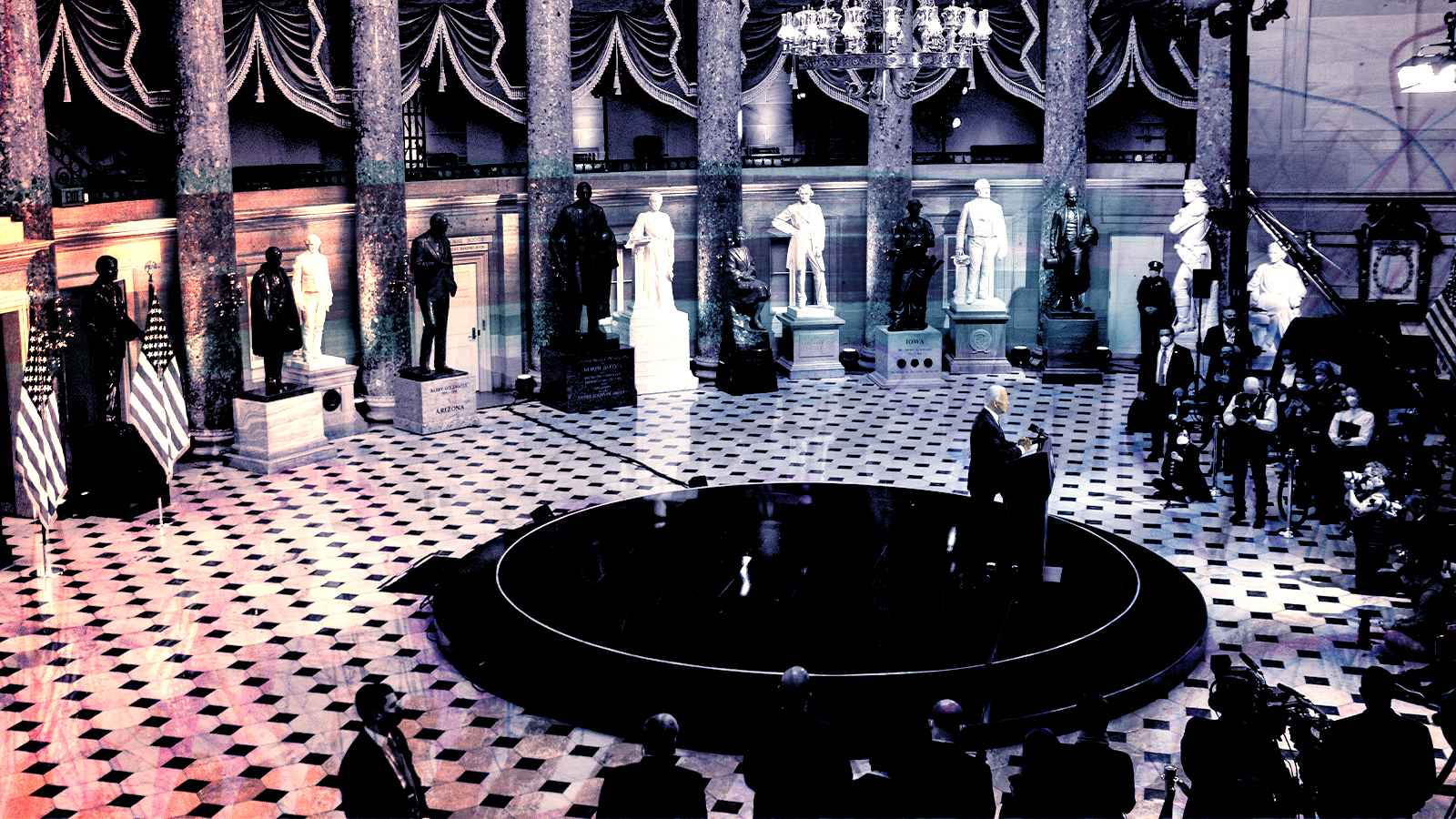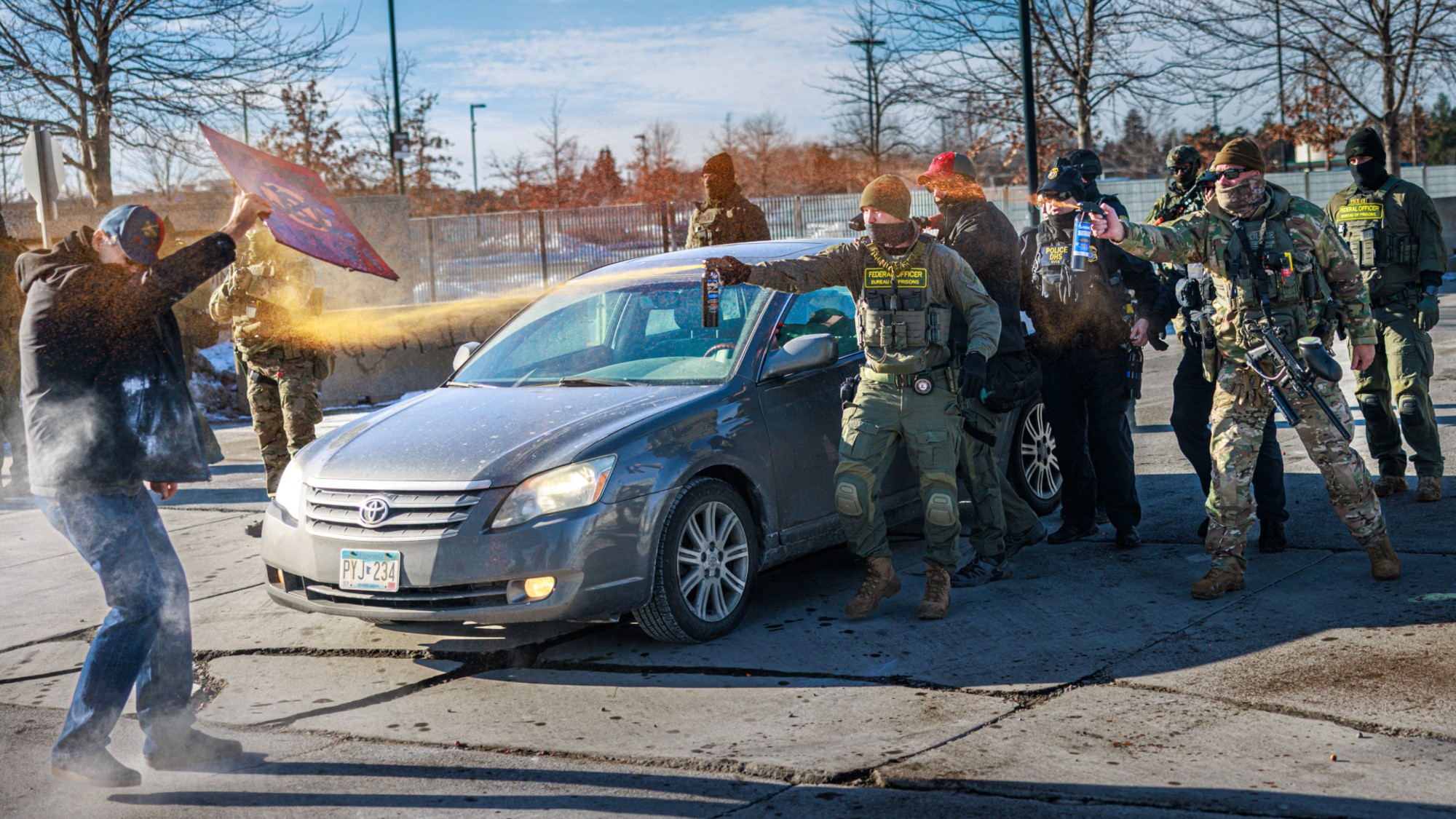Why we should do more politicizing — especially after Jan. 6
Republicans aren't so angry about the insurrection. They just object to how Democrats talk about it.


A free daily email with the biggest news stories of the day – and the best features from TheWeek.com
You are now subscribed
Your newsletter sign-up was successful
When President Joe Biden last week marked the anniversary of the Jan. 6 insurrection with a speech castigating former President Donald Trump for inciting the rioters, Sen. Lindsey Graham (R-S.C.) jumped to Trump's defense. "What brazen politicization of Jan. 6 by President Biden," the senator tweeted.
Graham immediately received a well-deserved roasting on social media. "Attempted coups are political," one critic pointed out. Seems obvious enough. Over the weekend, though, Graham doubled down — a sign his complaint of "politicization" by Democrats wasn't a silly gaffe, but an intentional strategy to defend Republicans from criticism for their role in the uprising.
"I was really disappointed in the tone of the president and the vice president — of the politicized Jan. 6," he told talk radio host John Catsimatidis. "The American people reject what happened on Jan. 6, but come November 2022, they are going to reject the Democratic Party."
The Week
Escape your echo chamber. Get the facts behind the news, plus analysis from multiple perspectives.

Sign up for The Week's Free Newsletters
From our morning news briefing to a weekly Good News Newsletter, get the best of The Week delivered directly to your inbox.
From our morning news briefing to a weekly Good News Newsletter, get the best of The Week delivered directly to your inbox.
Graham was joined Sunday by House Minority Leader Kevin McCarthy (R-Calif.), who went on TV to grumble about last week's Democrat-led anniversary commemorations while the House of Representatives was officially out on recess.
"You watch what they did last week when we were out, trying to politicize Jan. 6th," McCarthy told Fox News, quickly adding that "everybody believes what happened on Jan. 6th was wrong beyond wrong."
Not everybody. Most Americans agree that what happened on Jan. 6 was wrong. But poll after poll shows that Republican voters tend to take it less seriously — they describe the insurrectionists as "protecting democracy," or believe conspiracy theories that it was a "false flag" operation designed to discredit Trump and his followers. That leaves Graham and McCarthy in an awkward position. They can't defend the indefensible, but they can't criticize it too directly and remain in good standing with their party's base. That's how Sen. Ted Cruz (R-Texas) got in trouble with Tucker Carlson. So they've resorted to a third option: Taking offense at their opponents' anger.
What's worse than an insurrection? Talking honestly about it, apparently. That's ridiculous, and also a bit anti-democratic.
A free daily email with the biggest news stories of the day – and the best features from TheWeek.com
Politics, after all, is how we work out our collective problems. But it's a messy and sometimes ugly process, which makes charges of "politicization" so easy and potent: Regular Americans often don't like the way politics makes them feel. A USA Today poll taken last month found that for all our political polarization, nearly three-fourths of us would love for there to be less political hostility and more focus on finding common ground.
That sounds lovely. Almost.
With rare exception, we don't start with common ground on big issues. We have to journey to meet there. Sometimes that doesn't happen, sometimes it does, and sometimes it occurs only after a years-long process of bickering and argument. Americans — humans! — have wildly disparate visions of what constitutes the common good and how to achieve it. We use politics to hash out those disagreements so that we can come to some mutually acceptable (or acceptable enough) resolution of our differences. To complain about the politicization of some issue or event, then, is often an attempt to silence that process — a way to shout "shut up!" from some ostensible moral high ground.
You see this dynamic at work often in the aftermath of America's all-too-frequent gun massacres. The resulting complaints about the easy availability of firearms quickly generate fierce pushback from conservatives that the issue is being "politicized" for partisan advantage — never mind that public safety is one of the most basic functions of government. Indeed, such disasters are when politics are most-needed: Glenn Beck's "9/12 Project" longed to return to that post-9/11 moment when America was most unified in its rage against terrorist attackers. But that arguably de-politicized moment led to torture, the invasion of Iraq, and 20 years of war-making abroad. It was a disaster. A little more politicizing wouldn't have been welcomed at the moment, but it might have helped. Similarly, it's a good thing to politicize Jan. 6, and probably impossible to do otherwise.
The irony of Graham and McCarthy's remarks, of course, is that complaining about politicization is itself a political act. They weren't genuinely wishing for more common ground — Lindsey Graham's "more in sadness than in anger" act wore out its welcome years ago — but attempting to depict Democrats as callous and mean-spirited, and thus unworthy of holding power.
They've politicized the politicization of Jan. 6. You know what? That's politics.
Joel Mathis is a writer with 30 years of newspaper and online journalism experience. His work also regularly appears in National Geographic and The Kansas City Star. His awards include best online commentary at the Online News Association and (twice) at the City and Regional Magazine Association.
-
 The Olympic timekeepers keeping the Games on track
The Olympic timekeepers keeping the Games on trackUnder the Radar Swiss watchmaking giant Omega has been at the finish line of every Olympic Games for nearly 100 years
-
 Will increasing tensions with Iran boil over into war?
Will increasing tensions with Iran boil over into war?Today’s Big Question President Donald Trump has recently been threatening the country
-
 Corruption: The spy sheikh and the president
Corruption: The spy sheikh and the presidentFeature Trump is at the center of another scandal
-
 ‘Even those in the United States legally are targets’
‘Even those in the United States legally are targets’Instant Opinion Opinion, comment and editorials of the day
-
 The billionaires’ wealth tax: a catastrophe for California?
The billionaires’ wealth tax: a catastrophe for California?Talking Point Peter Thiel and Larry Page preparing to change state residency
-
 Bari Weiss’ ‘60 Minutes’ scandal is about more than one report
Bari Weiss’ ‘60 Minutes’ scandal is about more than one reportIN THE SPOTLIGHT By blocking an approved segment on a controversial prison holding US deportees in El Salvador, the editor-in-chief of CBS News has become the main story
-
 Has Zohran Mamdani shown the Democrats how to win again?
Has Zohran Mamdani shown the Democrats how to win again?Today’s Big Question New York City mayoral election touted as victory for left-wing populists but moderate centrist wins elsewhere present more complex path for Democratic Party
-
 Millions turn out for anti-Trump ‘No Kings’ rallies
Millions turn out for anti-Trump ‘No Kings’ ralliesSpeed Read An estimated 7 million people participated, 2 million more than at the first ‘No Kings’ protest in June
-
 Ghislaine Maxwell: angling for a Trump pardon
Ghislaine Maxwell: angling for a Trump pardonTalking Point Convicted sex trafficker's testimony could shed new light on president's links to Jeffrey Epstein
-
 The last words and final moments of 40 presidents
The last words and final moments of 40 presidentsThe Explainer Some are eloquent quotes worthy of the holders of the highest office in the nation, and others... aren't
-
 The JFK files: the truth at last?
The JFK files: the truth at last?In The Spotlight More than 64,000 previously classified documents relating the 1963 assassination of John F. Kennedy have been released by the Trump administration
